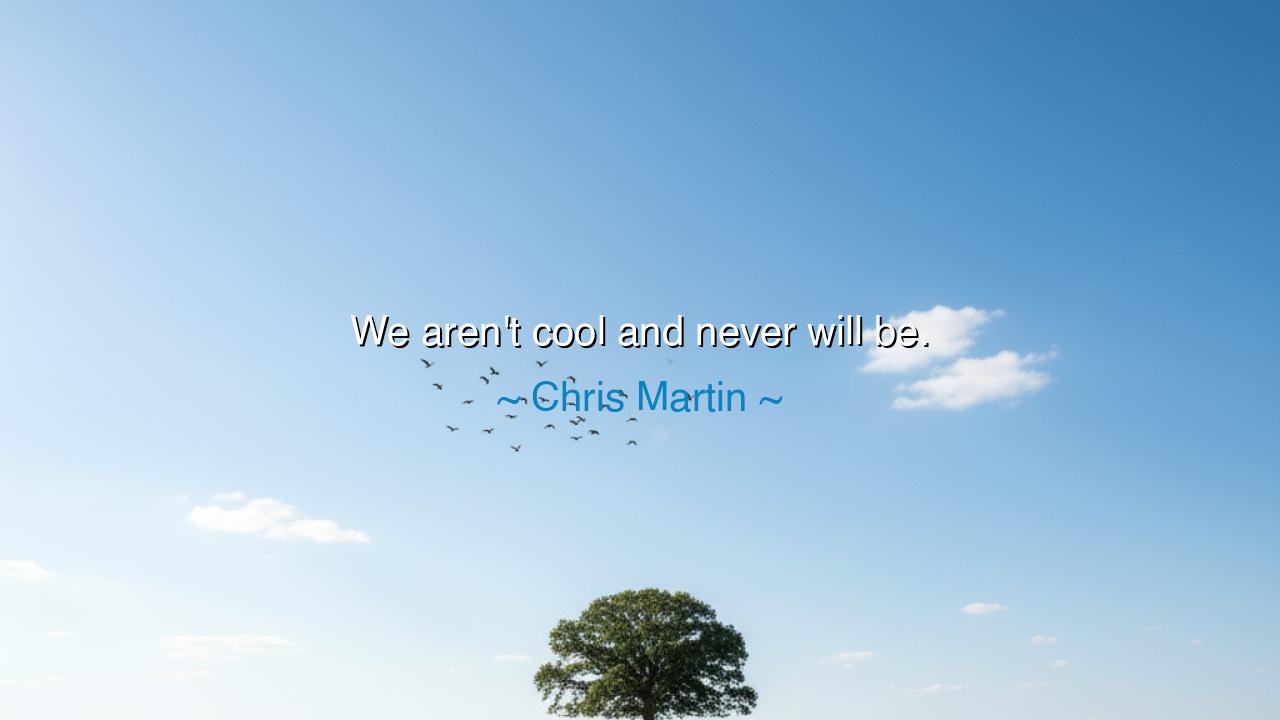
We aren't cool and never will be.






"We aren't cool and never will be." These stark words, spoken by Chris Martin, the lead singer of Coldplay, carry with them a profound truth about the nature of authenticity and the futility of societal approval. Martin's statement speaks not just to a moment of self-awareness, but to the deeper realization that the chase for coolness—that elusive and ever-shifting quality we seek to embody in our modern age—can never lead to true fulfillment. In this moment of raw honesty, Martin strips away the veneer of fame and recognition, offering us a glimpse into the true power of self-acceptance and genuine expression.
The concept of being "cool" is one that has captivated societies for centuries. The idea of coolness, particularly in modern times, is often tied to social status, appearances, and the ability to defy norms without seeming to try. However, the pursuit of such an ideal often comes at the expense of individuality and authenticity. The ancient Greeks, who valued wisdom and virtue above fleeting qualities like popularity, would likely have scoffed at the notion that a person’s worth could be defined by their adherence to the fickle standards of the crowd. For the Greeks, true greatness lay not in external approval, but in the cultivation of the soul and the pursuit of excellence in all things. Socrates, the great philosopher, rejected the conventions of his time, not to appear "cool," but because he believed in the higher pursuit of truth and understanding.
Chris Martin’s words resonate with the wisdom of the ancients in their rejection of superficial standards. When he says, "We aren’t cool," he is acknowledging a truth that many, especially those in the public eye, might avoid. His statement reflects the notion that coolness is often a facade, a mask worn to fit into a world that values image over substance. True greatness does not lie in conforming to these shallow standards, but in the courage to remain true to oneself, regardless of what others may think. Martin, by embracing this notion, elevates the discussion beyond the realm of fame or fashion into a deeper reflection on the power of self-truth.
Take, for example, the life of Leonardo da Vinci, a man whose brilliance was unquestioned, but who often operated outside of the societal norms of his time. Da Vinci was not concerned with being cool in the modern sense, but with the pursuit of knowledge and artistry. His work, while revolutionary, was not always appreciated in his own time, but his commitment to his own vision left an enduring legacy. His coolness, if we are to call it that, was not about his public image but his fearlessness in the pursuit of his craft. Da Vinci’s greatness lay not in his desire to fit in, but in his capacity to stand apart and to follow his own path, regardless of the passing judgments of his era.
Chris Martin’s acknowledgment that Coldplay “isn’t cool” mirrors this sentiment. It is a recognition that true success, both artistically and personally, lies not in chasing the approval of the masses, but in remaining authentic to one’s purpose and passion. Coldplay, despite being one of the most commercially successful bands in the world, does not conform to the fleeting trends of the entertainment industry. They focus on creating music that resonates with their own truths, rather than trying to conform to what is “cool” in the eyes of others. In this way, Martin’s words serve as an invitation to embrace authenticity, to reject the pressures of external validation, and to focus instead on what is genuinely important.
The lesson we can take from Martin’s words is profound: we are not bound by the expectations of others, nor should we define ourselves by the arbitrary standards of coolness set by society. In a world that often prizes external appearances and superficial approval, it is easy to lose sight of our true selves. However, by embracing authenticity and focusing on what truly matters to us—whether it be our passions, our relationships, or our purpose—we can find a deeper, more lasting sense of fulfillment. Just as Socrates and Da Vinci chose paths that may not have been “cool” in their time, we too must find the courage to forge our own way.
In practical terms, this means turning inward and asking ourselves: What is truly important to me? What do I value most in life? Rather than seeking external validation, we must learn to trust our own judgments and embrace the things that make us unique. Whether in our personal lives, careers, or creative endeavors, we should strive to define success on our own terms, rather than by the fleeting standards of popularity or social trends. Authenticity—not coolness—is the path to lasting happiness and true fulfillment.
Finally, let us remember that the pursuit of genuine expression and purpose is the true measure of success. Coolness, in its many forms, is often just an illusion—a momentary flash that fades as quickly as it appears. In contrast, authenticity, grounded in personal integrity and a commitment to one's deeper values, endures. Like Chris Martin, let us revel in our uniqueness and embrace the freedom that comes from being true to ourselves. For in doing so, we will leave a legacy far more enduring than any temporary notion of what is “cool.”






AAdministratorAdministrator
Welcome, honored guests. Please leave a comment, we will respond soon